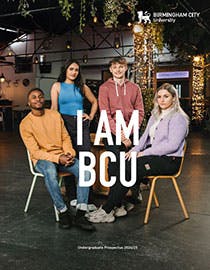Find your course
Find your course and next steps
Visit us at our next Open Day
There's so much going on in Birmingham. Study here and you'll be at the heart of it all! Coming to one of our Open Days is the perfect way to explore BCU.
Open DaysWorried about exams?
We’ve got a load of helpful articles and a guide containing expert tips on how to revise for exams, how to make revision notes and when to start revising.
Exams and revision helpA-Z Course List
Not sure which subject area your course belongs to? Browse through our list of courses sorted alphabetically.
Courses A-ZI AM BCU
We have a confident, proud and diverse community of students at BCU, who are striving to achieve their career goals and transform their lives.
Is Birmingham City University right for me?
Here's our top reasons to choose Birmingham City University.
-
1. Study in the heart of Birmingham
We're committed to developing graduates with the skills employers need. Studying in the heart of the UK's second city means you'll have unique opportunities to get involved with industry.
-
2. Over £400 million invested in our campuses
We've invested over £400 million in industry-standard, state-of-the-art facilities to ensure you have the best possible environment for practice-based learning.
-
3. Earn while you learn - jobs on campus
Our student employment agency allows you to apply for paid roles at the University, gaining experience in crucial aspects of job applications and valuable feedback on your work.
-
4. Work experience and placements
You'll have the chance to gain industry and professional practice experience through work placements and years abroad. We work with companies like Microsoft, Jaguar Land Rover and Sky UK.
-
5. Scholarships
We want all our students to achieve their full potential. With our two scholarship schemes, you could receive extra funding and support to kick start your BCU journey.
Your have not viewed any courses yet, why not use our course search to help find the right course for you.
Your list of saved courses is currently empty.
Did you know you can save the courses you're interested in at any time?
Saving a course allows you to create a permanent list of 'favourites' that will always be there when you visit our site. Once you’ve add at least two courses you can compare them side-by-side on screen.
It's simple to do, just look for the 'save this course' button.
Download your free revision guide!
